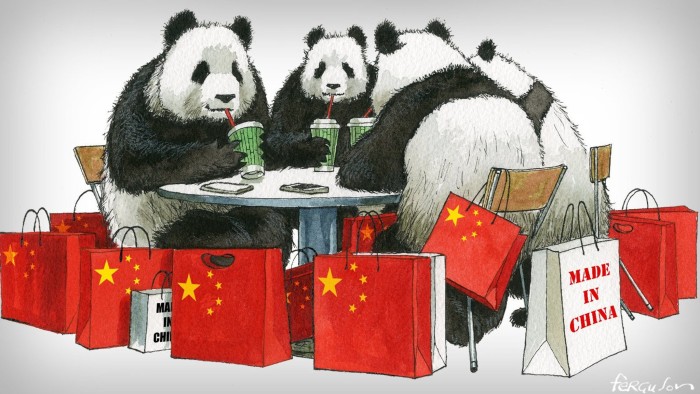Opinion today: China’s Great Rebalancing

This article is from today’s FT Opinion email. Sign up to receive a daily digest of the big issues straight to your inbox.
Unstable, unbalanced, uncoordinated and unsustainable: that, writes Martin Wolf in this week’s column was the Chinese economy before 2014. He is quoting former premier Wen Jiabao, who in 2007 used this description of China’s precarious economic growth. Expanding investment after the global financial crisis just brought new problems — not least a huge rise in debt.
But the past three years have witnessed a change, Martin explains, as consumption has risen at last and investment, although still high, has been falling. In fact in 2017, consumption contributed to 59 per cent of GDP growth, according to the China Development Forum’s background papers. Other good news includes the increasing role of service industries, which are more employment intensive than heavy industry, so that wages and disposable income have soared.
The chances of a smooth, desperately-needed rebalancing of the Chinese economy are rising.

The new digital cold war:
Richard Staropoli worries that China could steal a march on the US in the battle to control 5G. With this global technological challenge in mind, he argues for additional strategic sanctions against Beijing to target tech. Otherwise, he says, the internet is being handed over to control by the Chinese Communist Party.
The ratings game:
Sarah O’Connor believes that the recent debate about owning our personal data should extend to gig workers, who ought to be able to transport their performance feedback scores from platform to platform. This would ensure consistent online reputations and give these workers more power in the labour market, even given the flaws in public ratings.
Hug an investment banker:
Frederick Studemann watches the latest German hit TV drama Bad Banks, set in a rather glossy version of Frankfurt. And with fictional characters as complex as they are cosmopolitan, writes Fred, it’s a good advertisement for those contemplating a post-Brexit move from London’s Square Mile.
Best of the rest
I see no sign that this politics of devotion is doing us good — Rafael Behr in The Guardian
Institutional reform: we have to overcome the obstacles that the guardians of the status quo put in the way of modernisation — Thomas Clay in Le Monde
The new global youth movement, from Parkland to Bangladesh — Gordon Brown for Project Syndicate
A Saudi Prince’s quest to remake the Middle East — Dexter Filkins in The New Yorker
Saudi Crown Prince on Iran’s supreme leader and on Israel — Jeffrey Goldberg in The Atlantic
What you’ve been saying
Driverless cars will require different infrastructure — letter from Elliott Sclar
All transport is interaction between moving vessel and travel medium. Land-based modes require major capital investments in suitable physical infrastructure and administrative co-ordination between vehicle and travel medium. To date it has been implicitly assumed that existing configurations of streets, roads, traffic signalling, sidewalks and so on remain about as they are; only the physical driver disappears. It is important to remember that the present configurations evolved assuming human-operated rolling stock. The effectiveness, efficiency and safety of the new mode will greatly depend upon the degree to which the infrastructure is modified to accommodate its technology. All the adjustment cannot and will not be done in the vehicle.
Comment from dandino on Why Kim Jong Un came in from the cold
I grew up in South Korea as part of an American missionary family. At the time, both North and South Korea were very poor, and we were always worried that the North would attack at any moment. It is amazing that the uneasy peace has held for 60+ years. Of course the South is now an economic powerhouse, and the North, most likely has changed very little over the years. In comparison to the German situation, the Koreas have now been separated for a much longer period than East and West Germany, and the economic and cultural disparity is also much larger. Also I think the Chinese would not want a unified Korea, especially if it would be part of the West’s orbit of influence. An interesting point however, is that China actually has very good relations with South Korea, and there is a tremendous amount of trade between the two nations
Facebook users — you are Zuckerberg’s product — letter from David Tuckwell
Facebook’s users are not Mr Zuckerberg’s customers — they are his product. Facebook’s platform is totally free for users. It makes its money, rather like a free newspaper, by selling audiences to advertisers. His users are his audience and ergo his product. There’s a saying that runs: “If the product is free, you’re the product.” Facebook is an example.
Today’s opinion
The Chinese economy is rebalancing, at last We are seeing a necessary change towards more reliance on consumer demand
Inside Business: Panasonic’s Tesla woes echo identity crisis across Japan Inc Shift from consumer products has prompted soul-searching among biggest brands
The Tory meltdown in London is bad for business A Momentum-inspired Labour threatens a return to the bad old days of local socialism
Is Germany learning to love bankers at last? A TV series offers an alternative vision in a country often hostile to high finance
FT Alphaville: Baby Boomers want your family to finance a larger share of their retirement
FT View
FT View: Donald Trump’s grudge against Amazon and Jeff Bezos The US needs antitrust enforcement, it is getting a political vendetta
The Big Read
The Big Read: Why south-east Asia’s politics are proving a problem for Facebook
One of the company’s fastest-growing markets is also one of its most complex where hate speech and political manipulation are making it hard to remain neutral
Comments